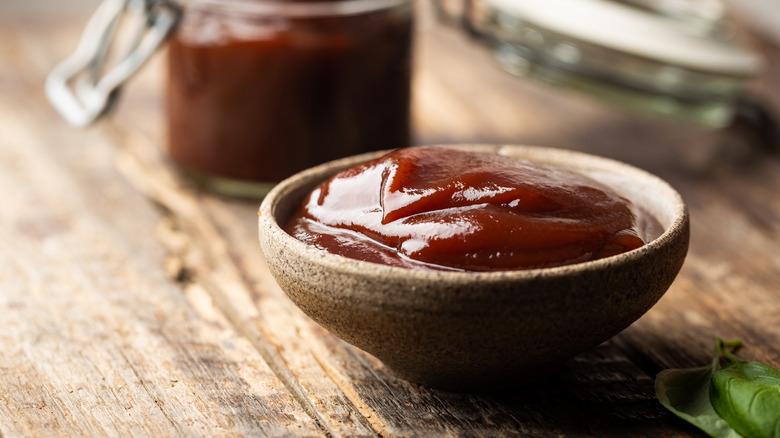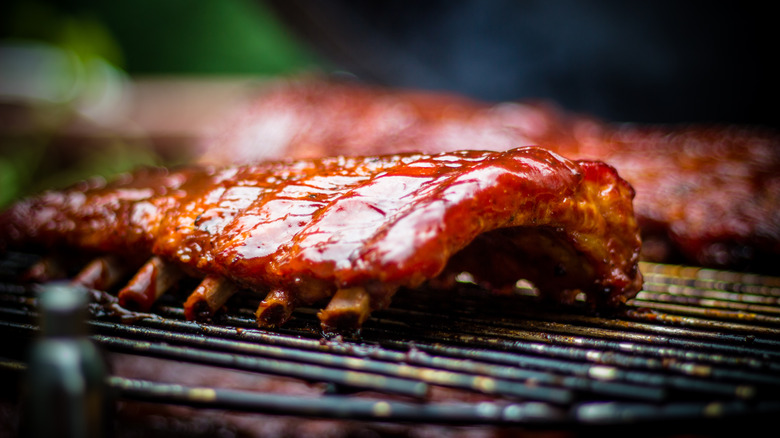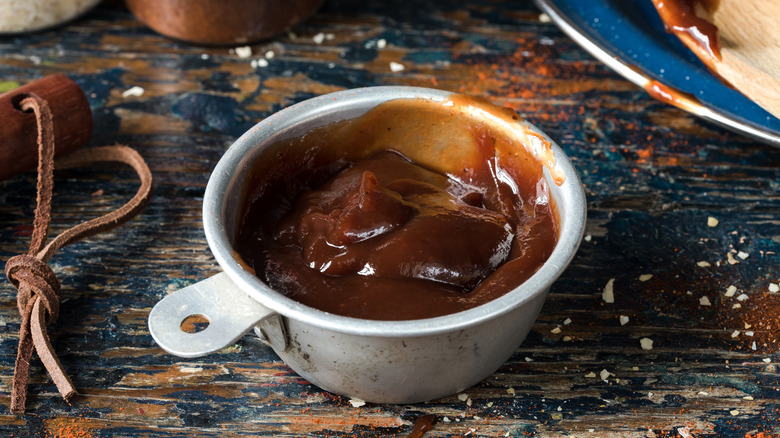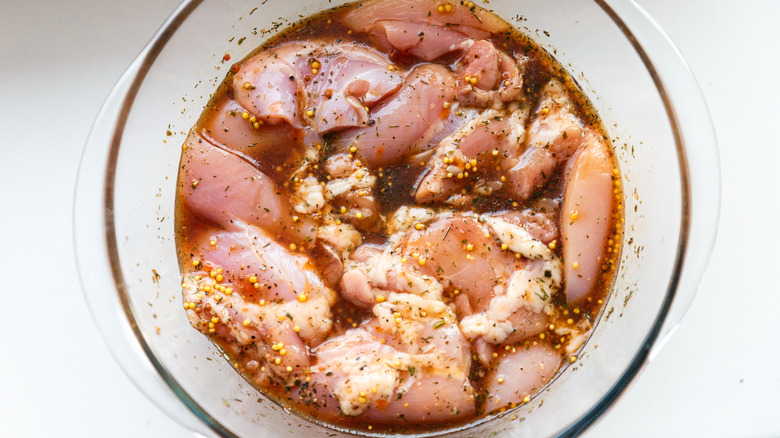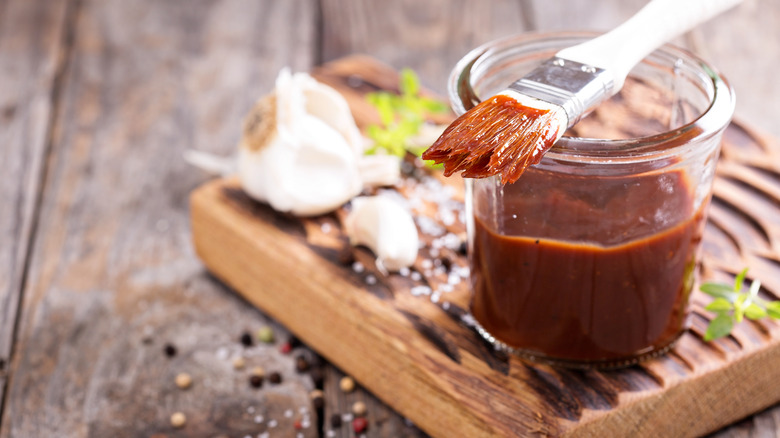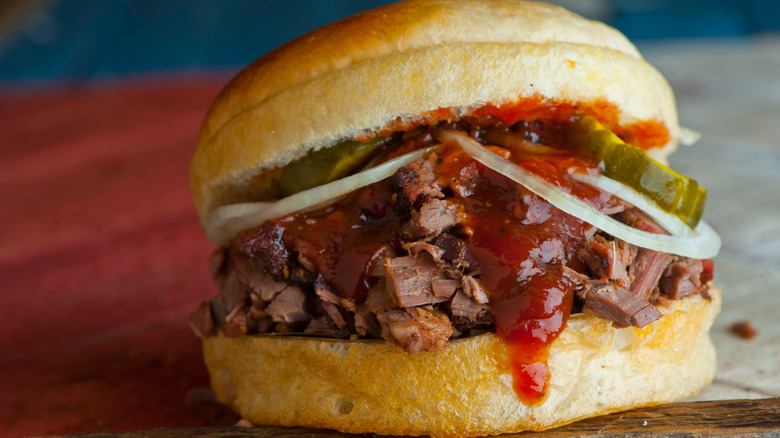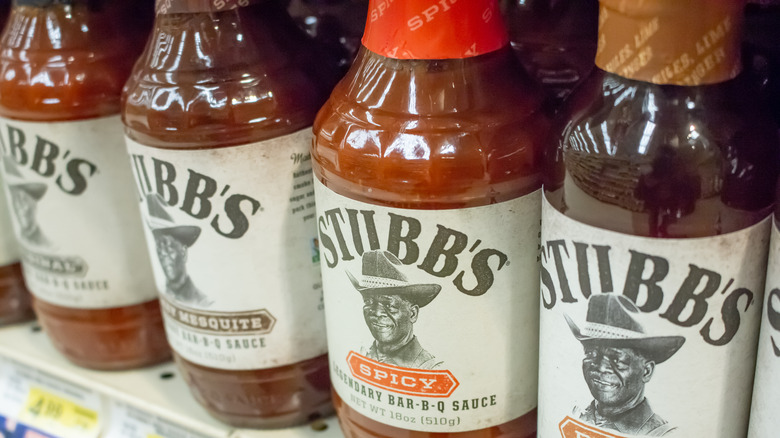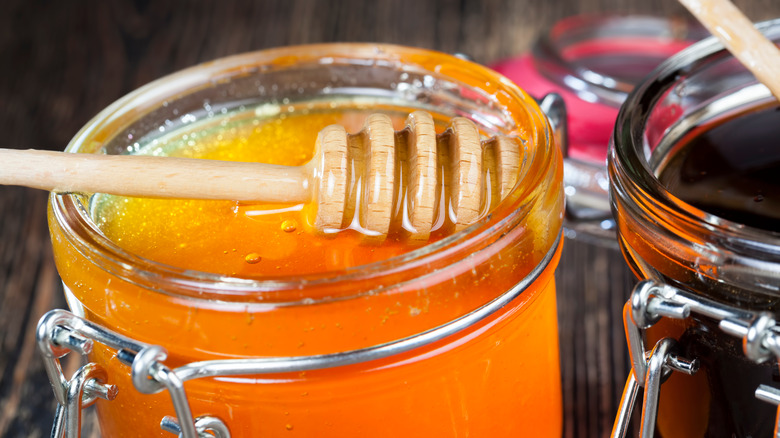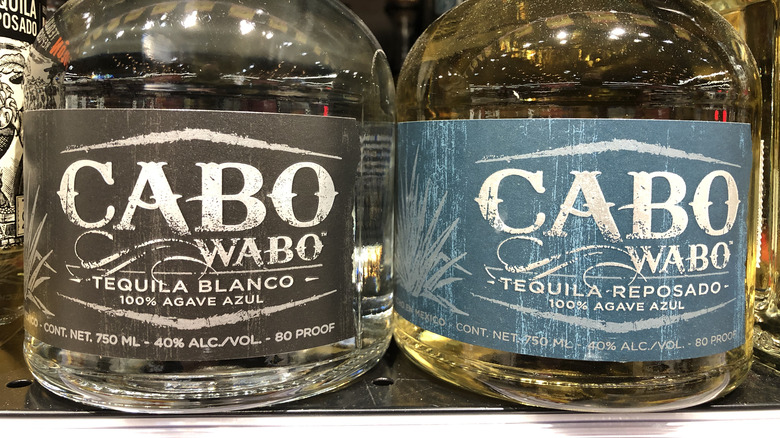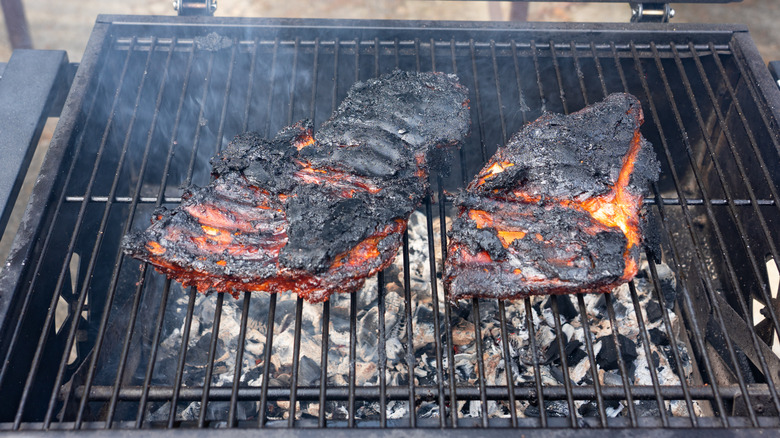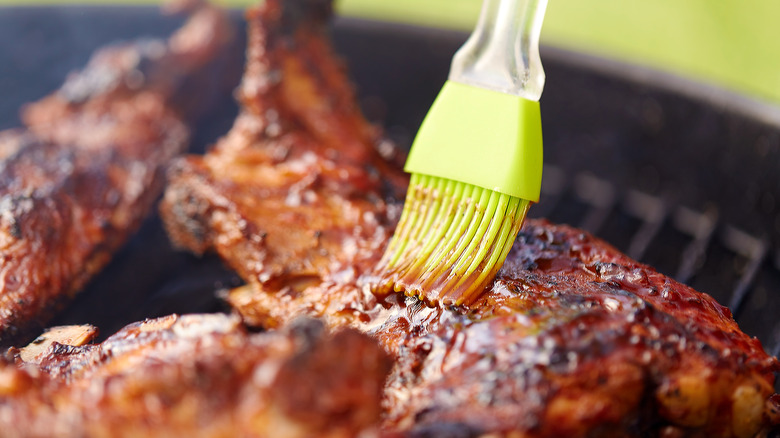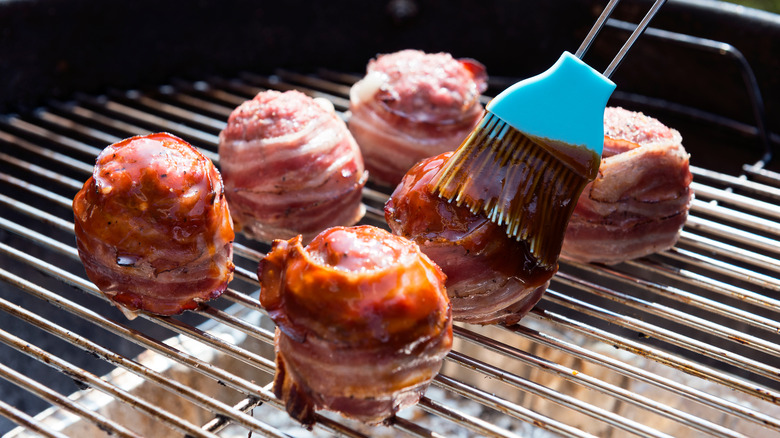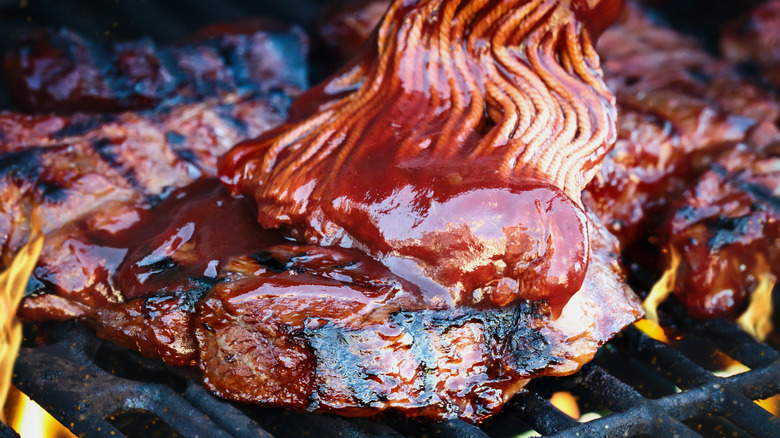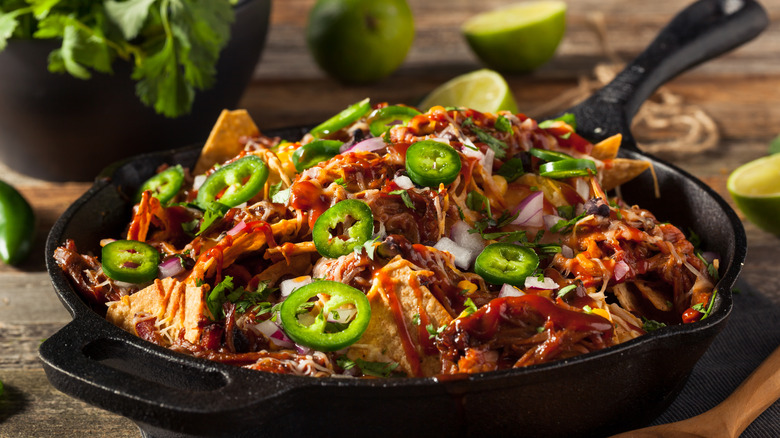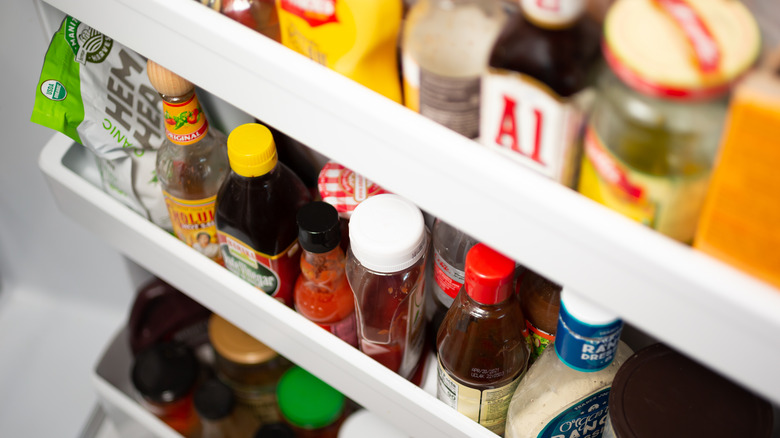The 14 Biggest Mistakes People Make With BBQ Sauces
You fire up the grill to make your favorite summertime meal, and retrieve all of your favorite condiments from the kitchen. What should you do this time? Marinade? Barbecue sauce? Rub? If you're like many home cooks, you'll reach for the barbecue sauce. After all, you don't have time to let your meat sit in a marinade in the fridge, and a rub just seems messy. Barbecue sauce is easy. Just slather it on your favorite cut of beef, pork, or chicken after you're done with the grilling or smoking and you're good to go... Right?
Unfortunately, while barbecue sauce seems like an easy condiment to use on your favorite grilled meats, there are quite a few ways you can go wrong when you're cooking with barbecue sauce. Seemingly simple decisions can result in a sauce that's runny, sticky, burnt, or lackluster at best — but there's no need to live your life in barbecue sauce misery. You can revamp your barbecue sauce experience for a better result the next time you fire up the grill, so long as you avoid these mistakes people make with BBQ sauces.
Not picking the right sauce for the type of meat you're cooking
All barbecue sauces are not the same, and if you consider yourself a barbecue connoisseur you likely already know this. The barbecue sauce served alongside your favorite smoked meats in the Carolinas, for example, is quite different from the sauce you'll find in Texas, which is equally different from the sauce you'll find in Kansas. And, just like different wines and beers pair best with certain foods, so do different barbecue sauces pair best with certain types of meat. It all comes down to the base ingredients.
According to Adam's Taphouse Grille, a barbecue restaurant known as "the place for ribs" since it opened in Maryland in 1981, you can expect vinegar-based barbecue sauces to pair best with whole hog or pork shoulder; tomato and vinegar-based barbecue sauces to pair best with pork ribs and rib tips; tomato and sugar-based barbecue sauces to pair best with high-fat meats, like ribs and brisket; and mustard-based barbecue sauces to pair best with pork and chicken. So, the next time you pull a bottle of barbecue sauce out of the fridge, opt for the style of barbecue sauce that best fits the cut of meat you're cooking up.
Not using the correct amount of barbecue sauce
If you think that the more barbecue sauce, the better, you might want to rethink your barbecuing strategy. While you may love the tangy taste of your favorite BBQ sauce, smothering your meat in it isn't always the best choice.
According to Jake's Famous Foods, a brand that offers its own line of barbecue rubs and sauces, it's tricky business determining the right amount of sauce for your meat. Add too much and you can't taste the meat; add too little and your meat may taste bland. To help you navigate the challenging meat-to-sauce ratio, Jake's has broken down how much sauce you need to use for popular barbecued items, based on factors such as cooking temperatures, cooking time, amount of sugar and water in a sauce, and size of your barbecued item. Considering all that, Jake's recommends (for the cooking process only, not the post-cooking dipping at the table) using a quarter-cup of barbecue sauce for items such as steak, lamb, pork, and burgers; using a half-cup of barbecue sauce for items such as beef roasts, veal, and whole chickens and turkeys; and using a scant eighth of a cup for items such as fish and shellfish. This all assumes that your items are "average" size for whatever it is you're cooking.
These qualities, Jake's says, should imbue your barbecued item with a fair amount of flavor, without overdoing it. Any extra sauce can be added at the table.
Treating your barbecue sauce like a marinade
We could say it over and over and over: barbecue sauce is not the same thing as a marinade — it's a barbecue myth that just won't go away. When you marinate your foods in barbecue sauce, you're doing them an injustice. Barbecue sauce should be used as a glaze, added during the cooking process, not before. If you marinate your meats in a barbecue sauce, you run the risk of leaving too much of the sauce on or in the cut of meat, which can lead to the sauce's ingredients, such as sugar, burning during the cooking process, which in turn leads to a nasty, burnt-sugar flavor.
You should really only add your barbecue sauce to your barbecued items during the latter part of the cooking process (more on timing-related barbecue sauce mistakes in a minute), or you can add it in the beginning of the cooking process if you plan to only cook your item for less than 20 minutes.
Not making your own barbecue sauce at home
You may have your favorite barbecue sauce brand (we all do), but have you ever considered making your own barbecue sauce at home? Not only can you create a sauce that's perfectly suited to your individual preferences, but you can also avoid all the sodium and sugar that store-bought sauces contain.
Think that surely it can't be that much sodium or sugar lurking behind your barbecue sauce's tangy or spicy exterior? Think again. According to a previous Mashed article, barbecue sauce is one of the worst foods for your heart health, due to the average barbecue sauce containing as much as 310 milligrams of sodium per a small serving of just a few tablespoons. That means, if you're really heaping on the sauce at your next cookout, you could easily be meeting or exceeding your recommended 2,300 milligrams of sodium per day, with just your barbecue sauce.
Additionally, many barbecue sauces contain a hefty helping of high fructose corn syrup, including popular sauces such as Kraft Original Barbecue Sauce and Sweet Baby Ray's barbecue sauce.
How you make your homemade barbecue sauce comes down to personal preference, but most recipes start with just ketchup, brown sugar, white vinegar, and Worcestershire sauce.
Serving runny homemade barbecue sauce
If you're making your own, homemade barbecue sauce, good for you. You're already one step closer to the best barbecue experience possible. However, one area where you could easily go wrong? Your homemade sauce's consistency.
No one wants a runny barbecue sauce! The best barbecue sauces are just thick enough that they can be slathered onto a cut of meat or used as a dip, giving you a fair amount of flavor that sticks around in one place without dripping or sliding right off onto your plate. Luckily, thickening your runny, homemade barbecue sauce is pretty easy. According to Better Homes & Gardens, you can thicken up your runny sauces either using flour or cornstarch. To use flour, just mix two tablespoons of flour with a fourth cup of cold water (for every cup of sauce you're making), stir that mixture into your sauce, and then heat it up until the mixture simmers. Let it simmer for one minute. Thicken your sauce with cornstarch by using one tablespoon of cornstarch mixed with one tablespoon of cold water for every cup of sauce you're making. Cook the mixture into your sauce, at a simmer, for two minutes.
Not customizing your store-bought barbecue sauce
Even if you don't want to go the way of homemade barbecue sauce, you can still upgrade your store-bought barbecue sauce with a little bit of customization — based on its existing flavor profile, or on your taste preferences. If your sauce is on the sweeter side (maybe thanks to all that high fructose corn syrup?), you might want to add some vinegar to your sauce; rice vinegar, apple cider vinegar, and red wine vinegar are all viable options to counteract that too-sweet taste. If you prefer a little kick of heat to your barbecue sauce, you might just need to add some of your favorite hot sauce — just be sure to add slowly and taste between additions, as the heat can add up fast. If your sauce just tastes a little "eh," you can add some depth of flavor with some extra sauces and seasonings such as mustard, Worcestershire sauce, garlic powder, or paprika.
Not adding honey to your barbecue sauce
We know what you're thinking — if most barbecue sauces err on the side of sweet with all that high fructose corn syrup, why would you want to add more sweetness to your sauce? But adding honey to your barbecue sauce, whether homemade or store-bought, can improve both the texture and the flavor. Adding honey to a spicier or already flavorful barbecue sauce can help even out those stronger flavors, while creating a more "viscous" texture (which also means your barbecue sauce will be less runny).
If you're making barbecue sauce at home, you can add your honey in place of brown sugar or another sweetener, such as molasses. Even agave nectar works in the same way, if you want to add honey to your barbecue sauce, but you're looking for a vegan alternative. For even more thickness and a stronger honey taste, look beyond your standard grocery store honey and opt for manuka honey, a New Zealand-derived variety that's not only tasty, but also comes with a host of health benefits.
Not adding tequila to your barbecue sauce
Honey makes a lot of sense as a barbecue sauce ingredient. It's a natural sweetener, after all, and barbecue sauce requires some sort of sweetener ingredient. But tequila? Believe it or not, tequila is exactly the boozy ingredient your barbecue sauce may need.
As we've previously reported, it's all because tequila is derived from agave (remember how we said that you could use agave nectar as your vegan honey alternative the next time you're whipping up some vegan barbecue sauce?). The tequila adds fruity notes to your barbecue sauce, but don't add too much of the spirit to the mix — or else your barbecue sauce could end up tasting more like a college trip to Cancun than a high-end culinary creation.
We recommend adding two to four tablespoons of an affordable tequila to your barbecue sauce, simmering it until you've reached your desired taste, adding more sauce and/or tequila until you reach both the flavor and the texture you want.
Burning your barbecue sauce
Once you have your barbecue sauce's texture and flavor just right, no matter if you purchased it from the store and tweaked it, or you made it from scratch, it's time to add the sauce to your favorite piece of meat (or your favorite barbecued item in general — there's no reason your sauce has to be slathered on a hunk of protein every time). You're not in the clear yet, though. You want to still take some precautions and avoid a few common mistakes — like inadvertently burning your barbecue sauce.
Any time you cook with a sugary sauce (like barbecue sauce), either on the grill or for a long period of time in your oven — anywhere that there's either high heat or prolonged heat — you can end up with a black, not-very-tasty crust all over your pan or casserole dish, and worst of all, all over your food. The sugar in the sauce cooks faster than the food. Because of this, you want to wait until your food is very nearly done before you add your barbecue sauce. For particularly sugary or sticky sauces, we recommend waiting until about the last five minutes of cooking.
Not adjusting your sauce application method according to what you're cooking
But again — you're not in the clear just yet. For even better results, you may want to further refine your sauce application according to the type of meat or other food you're cooking, versus just throwing it on in the last five minutes.
Chad's Bar-B-Cue, a barbecue-focused restaurant in Maryland, offers a few, more specific recommendations. For chicken, Chad recommends adding the sauce during the final 10 to 15 minutes of cooking, for a tasty, sticky coating that's not burnt (you want to definitely go with a thick, sticky sauce, too, or it just won't stay on the chicken). For beef, though, Chad says you can add the sauce a little earlier, without worrying about burning; in fact, he adds his sauce before the cooking starts, and then adds extra sauce very hour. For pork, Chad recommends only applying the sauce after the meat has been cooked completely.
Risking your family's health by exposing your food to cross-contamination
Cross-contamination is always a worry, no matter what you're cooking, but it can be oh-so-easy to accidentally cross-contaminate while grilling, especially if you're grilling with barbecue sauce. You brush some barbecue sauce onto your raw chicken thighs using a barbecue brush; you place the brush that's touched the chicken back into your sauce bowl; then, once the chicken is done, you reach for that same brush to give it another coating. You take the bowl to the kitchen and use another utensil to serve sauce to your guests. It's a food poisoning outbreak waiting to happen.
The Centers for Disease Control recommends separating the sauce you plan on using for raw meat from the sauce you plan on using for cooked meat, so that you can throw out any barbecue sauce that's come in contact with either raw meat or a utensil that's touched raw meat. And don't use the same utensils all throughout the cooking and then serving process. Use one utensil for adding barbecue sauce to your food while it's raw and still cooking, and then switch to a clean utensil once the food is thoroughly cooked and safe. Then, use a new, clean utensil and clean plate when finally removing your food from the grill for serving. It makes for a lot of dirty dishes, but trust us, it's worth it.
Not using a mop sauce
Once you have the barbecue sauce application process mastered, level your barbecue game up further with a mop sauce. A runnier version of a barbecue sauce, a mop sauce is usually made with a flavor profile similar to that of a barbecue sauce, just with more of a liquid base (think a vinegar or even a fruit juice base) (via FoodFireFriends). You use a miniature mop to add the liquid to your meat during the cooking process, to further enhance your food's flavor. A mop sauce is typically used for larger cuts of meat that cook slowly, as well as on cuts of meat that you're smoking versus simply grilling (as the mop sauce helps the smoke adhere to the meat).
Of course, a mop sauce isn't ideal for every barbecue situation. If you're cooking something quickly, such as chicken breasts on the grill, there's no need for a mop sauce; your barbecue sauce alone will add all the flavor you need. Additionally, a mop sauce can lower the overall temperature of your food, meaning it takes longer to cook.
Throwing out your leftover barbecue sauce
If you've done a great job of keeping your barbecue sauce free from cross-contamination, you may feel a tinge of regret as you toss that leftover goodness into your trash bin after a grill session. But just hold it right there. Even if you don't plan on grilling or barbecuing in the near future, there's no reason to throw out your leftover (uncontaminated) barbecue sauce. Keep it on hand and use it for other dishes or even as a dipping sauce for fries and veggies.
Real Simple suggests using your leftover barbecue sauce, either store-bought or homemade, as a zesty addition to your salad dressings, nachos, pizza, potato salad, or even hot dogs. You can also start making barbecued versions of favorite foods that you might not normally barbecue, such as barbecue tofu crumbles or barbecued sweet potato. You can even adjust your barbecue sauce's flavor profile to turn it into a completely new sauce, such as a shrimp cocktail sauce.
Not throwing out your barbecue sauce once it reaches a certain age
While you should do all you can to save your leftover barbecue sauce if it's newly made or a fresh bottle, there comes a point where you have no other choice than to toss out that nasty old barbecue bottle that's been sitting in the back of the fridge. So how old is too old when it comes to barbecue sauce?
According to Still Tasty, you can keep store-bought, bottled barbecue sauce open in the pantry for a month, for best quality, but in the refrigerator, the open bottle will stay fresh for up to nine months. Even after this length of time, though, your barbecue sauce will still be safe to eat. Signs that it's gone bad and could be unsafe to consume include an abnormal odor, darker-than-normal color, or the presence of mold. If you do work up the nerve to try your old barbecue sauce, the taste should also give you a hint as to whether or not the sauce is safe.
